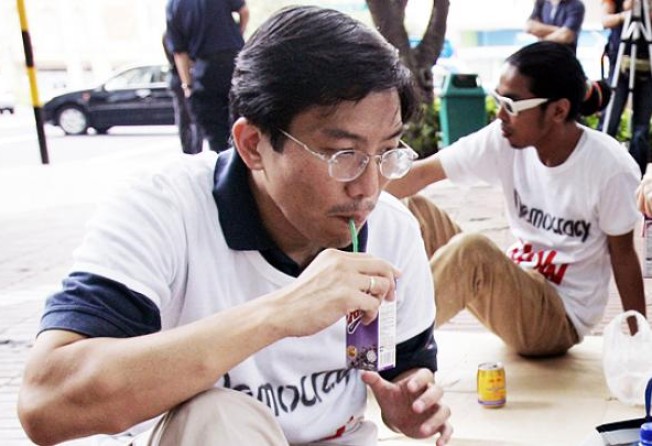Singapore opposition leader freed from bankruptcy

Prominent Singapore opposition leader Chee Soon Juan has been discharged from bankruptcy, the government said Wednesday, after an unprecedented concession by two former prime ministers to whom he owed about US$408,000.
Ex-prime ministers Lee Kuan Yew and Goh Chok Tong agreed to accept a reduced amount of S$30,000 (US$24,500) from Chee, which will free him from bankruptcy proceedings formally on Friday, said a statement by the Insolvency and Public Trustee’s Office.
Chee, the firebrand leader of the Singapore Democratic Party, was declared a bankrupt in 2006 after he failed to pay S$500,000 in court-ordered damages to Lee and Goh. The two had sued him for defamation for comments he made against them during the 2001 general elections.
The development means Chee, 50, will be able to travel outside the country freely and also contest the next elections, which are due in 2016. Still, some commentators saw the concession by Lee and Goh as a political manoeuvre – allowing Chee to contest the elections could split the fragmented opposition’s votes further at a time the ruling People Action Party (PAP) itself has lost much popular support because of rising prices and an influx of foreigners.
“It could be that Lee Kuan Yew has mellowed, but it’s hard to believe that he has changed because it doesn’t fit his character,” said respected political commentator and former newspaper editor P.N. Balji.
“The other possibility, to discharge Chee from bankrupt, could be to ‘muddy the waters’ especially for the coming general elections. Chee’s party and the (other opposition) Workers’ Party do not see eye to eye and there might be a split in votes for the opposition,” Balji said.
Lee, modern Singapore’s founding father, and Goh have frequently and successfully sued opposition leaders and other critics for defamation. A report published by the Human Rights Watch in January criticised the country for resorting to charges of contempt of court, criminal and civil defamation as well as sedition to rein in its critics. Among those sued are publications such as The Economist, the International Herald Tribune and the Far Eastern Economic Review.
Lee was Singapore’s prime minister from 1959 to 1990, when he handed over power to Goh. Lee continued to work for the government, first as “senior minister,” a non-executive advisory post specially created for him, and from 2004 until last year as “minister mentor.” Goh was prime minister from 1990 to 2004, when the prime ministership went to Lee’s son, Lee Hsien Loong.
Chee, a trained neuropsychologist, raised the S$30,000 primarily through donations and proceeds from the sale of his books on politics. He was informed in September that both Lee and Goh were willing to accept the reduced amount.
“As the creditors have not objected to Dr. Chee’s debt settlement proposal, it is deemed that they have accepted the proposal, as provided for under the Bankruptcy Act,” the statement from the Insolvency and Public Trustee’s Office said.
As a bankrupt, Chee was required to seek government’s permission to travel. Earlier this year his request to attend the Oslo Freedom Forum – a conference on human rights where Chee was scheduled to be a guest speaker – was denied.
“The important thing is that being discharged from bankruptcy means it will allow me to plan and lead the party into the next general election,” Chee told reporters.
“The big strategy that we’re banking on right now is to come up with shadow policies on healthcare and housing as alternatives to that of the government. The PAP is floundering in these policies and in taking the country forward.”